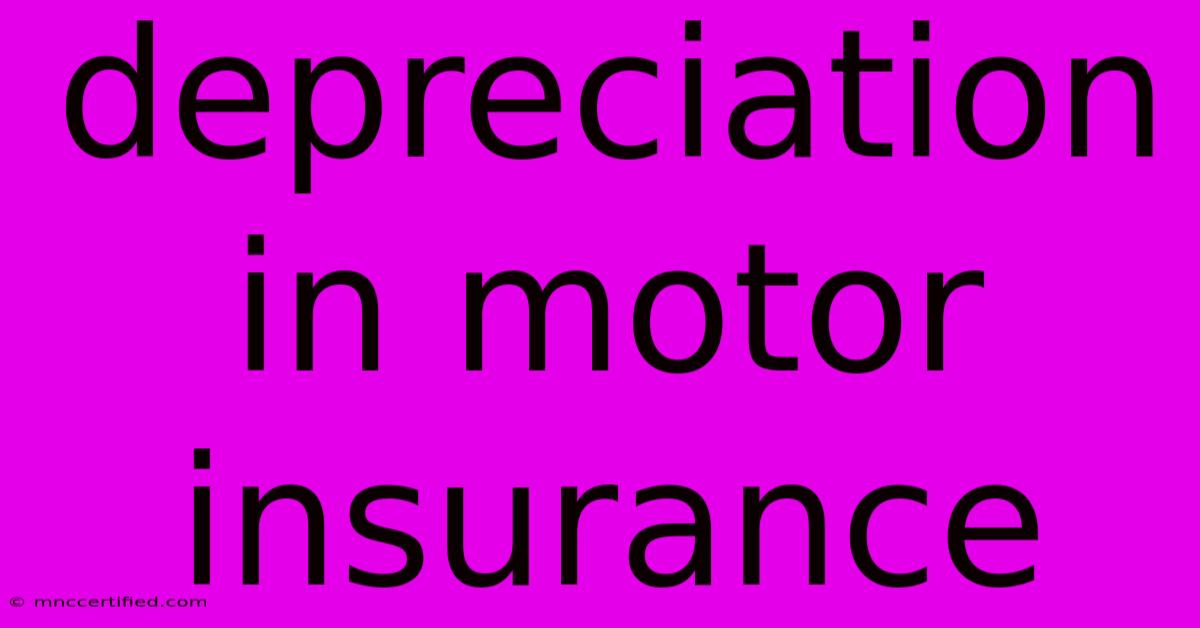Depreciation In Motor Insurance

Table of Contents
Depreciation in Motor Insurance: Understanding How it Affects Your Claim
Depreciation is a crucial factor to understand when it comes to motor insurance claims. It represents the loss in value of your vehicle over time due to age, wear and tear, and market factors. This article will delve into the complexities of depreciation and how it impacts your payout after an accident or other insured event.
What is Depreciation and How Does it Affect My Claim?
Depreciation is the reduction in the value of your car from the moment you drive it off the dealership lot. Several factors influence the rate of depreciation, including:
- Make and Model: Some car brands depreciate faster than others. Luxury vehicles often depreciate more quickly than more economical models.
- Mileage: Higher mileage generally equates to faster depreciation.
- Condition: Proper maintenance and a clean driving record can help mitigate depreciation, but accidents and damage significantly accelerate the process.
- Market Demand: The overall demand for your car's make and model impacts its resale value and, therefore, its depreciation rate.
When you make a claim for damage to your vehicle, the insurance company will consider the depreciation of your car when calculating the settlement amount. This means you likely won't receive the full cost of repair or replacement, especially if your car is older. They’ll assess the pre-accident value and deduct the depreciation to determine the amount they’ll pay. This can lead to a significant difference between the repair cost and the insurance payout.
Example: Understanding the Impact of Depreciation
Let's say your car was involved in an accident, requiring $5,000 in repairs. If your car has depreciated by 20% since its purchase, the insurance company might only pay you $4,000. The remaining $1,000 represents the depreciated value.
Types of Depreciation Methods Used by Insurers
Insurance companies employ different methods to calculate depreciation:
- Straight-Line Depreciation: This is the simplest method, calculating depreciation at a fixed rate per year. While easy to understand, it may not accurately reflect the actual market value.
- Declining Balance Depreciation: This method considers a higher depreciation rate in the early years of the car's life and a lower rate as it gets older. This usually reflects market realities more accurately.
- Market Value Depreciation: This approach uses current market prices for similar vehicles to determine the depreciated value. It’s often considered the most accurate but can be more complex to assess.
It's important to note that the specific method used varies between insurance companies and policies. Review your policy documents carefully to understand the depreciation method your insurer uses.
Minimizing the Impact of Depreciation on Your Claim
While you can't entirely avoid depreciation, you can take steps to minimize its impact on your insurance claim:
- Comprehensive Coverage: Opt for comprehensive insurance coverage, which typically covers damages from accidents, theft, and other incidents, regardless of fault. This is crucial for protecting against significant financial losses due to depreciation.
- Understand Your Policy: Thoroughly read your policy documents and understand the depreciation calculation method used by your insurer. Ask questions if anything is unclear.
- Maintain Your Vehicle: Regular maintenance and keeping your car in good condition can help slow down depreciation and improve its resale value.
- Negotiate with Your Insurer: If you believe the depreciation calculation is unfair, don't hesitate to negotiate with your insurer. Provide evidence supporting your claim, such as independent valuations.
- Consider Gap Insurance: Gap insurance covers the difference between the actual cash value of your vehicle and the amount you still owe on your loan or lease. This is particularly beneficial for newer cars with high depreciation rates.
Key Takeaways: Navigating Depreciation in Motor Insurance
Depreciation is an unavoidable aspect of car ownership, and it significantly impacts insurance claims. Understanding how depreciation is calculated and the methods used by your insurer is crucial to protecting your financial interests. By choosing the right coverage, maintaining your vehicle, and carefully reviewing your policy, you can mitigate the effects of depreciation and ensure a fairer settlement in the event of an accident or other covered incident. Don't hesitate to seek clarification from your insurer or consult a legal professional if you have any questions or concerns about depreciation in your motor insurance policy.

Thank you for visiting our website wich cover about Depreciation In Motor Insurance. We hope the information provided has been useful to you. Feel free to contact us if you have any questions or need further assistance. See you next time and dont miss to bookmark.
Featured Posts
-
Harley Davidson Insurance Quote
Nov 24, 2024
-
Affordable Insurance Milford Ma
Nov 24, 2024
-
Celtic Vs Hearts Lineup And Match Prediction
Nov 24, 2024
-
Whats Next For Man City Post Spurs
Nov 24, 2024
-
Brickstreet Mutual Insurance Co
Nov 24, 2024